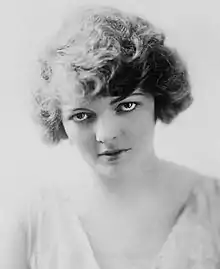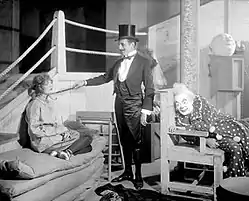Margalo Gillmore | |
|---|---|
 | |
| Born | Margaret Lorraine Gillmore 31 May 1897 London, England |
| Died | 30 June 1986 (aged 89) New York City, U.S. |
| Alma mater | American Academy of Dramatic Arts |
| Occupation | Actress |
| Years active | 1917–1966 |
| Spouse |
Robert Ross
(m. 1935; died 1954) |
| Parent | Frank Gillmore |
| Relatives | Sarah Thorne (great-aunt) Thomas Thorne (great-uncle) George Thorne (great-uncle) |
Margaret Lorraine "Margalo" Gillmore (31 May 1897 – 30 June 1986) was an English-born American actress who had a long career as a stage actress on Broadway. She also appeared in films and TV series, mostly in the 1950s and early 1960s.

Family
Gillmore was the daughter of Frank Gillmore, a founder and former president of Actors' Equity,[1] and the actress Laura MacGillivray, and the sister of actress Ruth Gillmore. Her great-aunt was the British actor-manager Sarah Thorne, and her great-uncles were the actors Thomas Thorne and George Thorne.
Career
A fourth-generation actor on her father's side, Gillmore trained at the American Academy of Dramatic Arts. Her stage acting career stretched from The Scrap of Paper in 1917 through to Noël Coward's musical Sail Away on Broadway in 1961.[1] She was first noticed by the critics in the 1919 play The Famous Mrs. Fair, in which she appeared with Henry Miller and Blanche Bates. In 1921 she played the tubercular patient Eileen Carmody in Eugene O'Neill's The Straw, and in 1922 she portrayed Consuelo in the United States premiere of Leonid Andreyev's He Who Gets Slapped. In 1936, she originated the role of Mary Haines in Clare Boothe Luce's play The Women,[1] and in 1945 she originated the role of Kay Thorndike in the Pulitzer Prize-winning play State of the Union.[2] Gillmore appeared regularly with the Theatre Guild.
Having appeared as an extra in a silent film for the Vitagraph Studios in 1913, aged 16, and in a short, The Home Girl in 1928, Gillmore made her sound-film debut in 1932 in Wayward, but did not appear on screen again until the 1950s in such films as Perfect Strangers (1950), Cause for Alarm! (1951), Woman's World (1954), High Society (1956) and Upstairs and Downstairs (1959).
During World War II, Gillmore had a role in the traveling production of The Barretts of Wimpole Street.[1] The production starred much of the original Broadway cast headed by leading actress Katharine Cornell, and directed by Cornell's husband Guthrie McClintic. The play entertained troops in Italy, France and England and reached within a few miles of the front in the Netherlands. The cast made a point of visiting military hospitals every day.
Gillmore played Mrs. Darling in the Broadway and televised versions of Peter Pan starring Mary Martin. She was a member of the famous Algonquin Round Table.[3]
In 1964 she wrote her autobiography Four Flights Up, published by Houghton Mifflin.[4]
Death
On 30 June 1986, Gillmore died of cancer, aged 89, in her New York City apartment. [5]
Filmography
| Year | Title | Role | Notes |
|---|---|---|---|
| 1928 | The Home Girl | short film | |
| 1932 | Wayward | Louisa Daniels | |
| 1950 | Perfect Strangers | Isobel Bradford | |
| The Happy Years | Maude Stover | ||
| 1951 | Cause for Alarm! | Mrs. Edwards | |
| The Law and the Lady | Cora Caighn | ||
| Behave Yourself! | Mother | ||
| Elopement | Claire Osborne | ||
| 1952 | Skirts Ahoy! | Lt. Cmdr. Stauton | |
| 1953 | Scandal at Scourie | Alice Hanover | |
| 1954 | Woman's World | Mrs. Evelyn Andrews | |
| 1956 | Gaby | Mrs. Helen Carrington | |
| High Society | Mrs. Seth Lord | ||
| 1959 | Upstairs and Downstairs | Mrs. McGuffey | |
| 1966 | The Trouble with Angels | Sister Barbara |
References
- 1 2 3 4 Ennis, Thomas W. (July 2, 1986). "Margalo Gillmore, An Actress on the Stage and on Screen". The New York Times. Retrieved November 11, 2018.
- ↑ "State of the Union, Hudson Theatre, New York City, from November 14, 1945 to September 13, 1947". Playbill.com. Retrieved November 11, 2018.
- ↑ "Members of the Round Table". AlgonquinRoundTable.com. Retrieved November 11, 2018.
- ↑ "Margalo Gillmore dies". UPI.com. July 2, 1986. Retrieved November 11, 2018.
- ↑ Los Angeles Times obituary